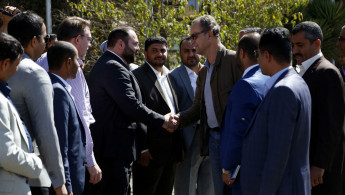Yemen's Houthi rebels boycott meeting with UN-led truce monitors
Houthi rebel negotiator Mohammad Abdel-Salam claimed retired Dutch general Patrick Cammaert, who is leading a joint committee tasked with overseeing a truce in the Red Sea port city and the withdrawal of both parties, ”steered from the course of the agreement by implementing other agendas".
"If [UN envoy to Yemen Martin] Griffiths does not address the issue, it is going to be difficult to discuss any other matter," he said on Twitter without elaborating.
An AFP photographer said that the Houthi representatives did not take part in the committee meeting in Hodeida on Sunday, however the UN declined to comment.
Clashes erupted between Houthi rebels and government forces in Hodeida Saturday, dealing a new blow to the fragile truce.
At talks in Sweden last month, the UN brokered several agreements between the Houthi rebels and the Saudi-backed government seen as the best chance of ending nearly four years of devastating conflict.
The warring sides agreed on truce deals for the key rebel-held aid port of Hodeida and battleground third city Taiz.
The rebel-held port city, which is a lifeline for the delivery of desperately needed humanitarian aid, was for months the main front line in the Yemeni conflict after government forces supported by Saudi Arabia and its allies launched an offensive to capture it in June.
Diplomatic efforts
The United Nations has said the truce has largely held since it came into force on December 18 but there have been delays in the agreed pullback of rebel and government forces.
The Houthis control most of Hodeida while government forces are deployed on its southern and eastern outskirts.
After meeting Yemen’s President Abedrabbo Mansour Hadi, UN envoy Martin Griffiths warned on Wednesday that "substantial progress" was needed to advance peace efforts in Yemen before new talks can be held on ending the devastating war.
Addressing the Security Council, Griffiths said he was still "hopeful" that negotiations to follow up on a ceasefire deal reached last month in Sweden will be held "in the near future."
The breakthrough at the Sweden talks buoyed hopes of an end to the conflict, but the envoy's statement underscored that the diplomatic gains toward peace were fragile and the pace of progress slower than anticipated.
Talks are ongoing on a redeployment of forces from Hodeida, providing security in the city and opening up access routes to allow humanitarian convoys to reach millions in dire need of food aid, he added.
A meeting will be held in Amman next week to follow up on an agreed prisoner swap that could pave the way to an airlift of "many, many thousands" of detainees from both sides.
Griffiths briefed the Security Council after a round of shuttle diplomacy in the region including talks with rebel leaders in Sanaa and Hadi in Riyadh on shoring up the ceasefire deal.
The United Nations is working to schedule a new round of talks, possibly in Kuwait, to build on the Stockholm agreement and advance toward a final deal to end the conflict.
The war between the Houthis and troops loyal to the government escalated in March 2015, when President Hadi fled to Saudi Arabia and the Riyadh-led coalition intervened.
The conflict has unleashed the world's worst humanitarian crisis, according to the UN, which says 80 percent of the population - 24 million people - are in need of aid.
Nearly 10 million people are just one step away from famine, UN aid chief Mark Lowcock warned.
Follow us on Twitter: @The_NewArab





 Follow the Middle East's top stories in English at The New Arab on Google News
Follow the Middle East's top stories in English at The New Arab on Google News
![Israeli forces ordered bombed Gaza's Jabalia, ordering residents to leave [Getty]](/sites/default/files/styles/image_330x185/public/2176418030.jpeg?h=a5f2f23a&itok=_YGZaP1z)

